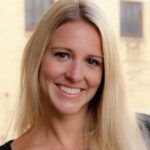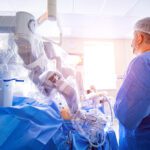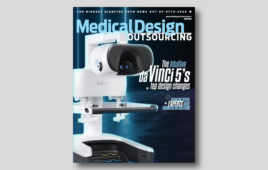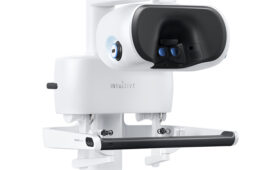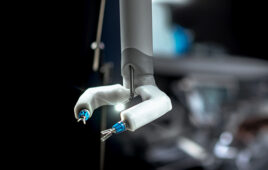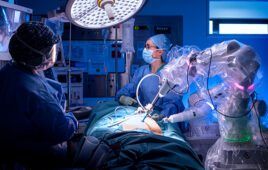
Intuitive President Dave Rosa [Photo courtesy of Intuitive]
They said surgeons would never use them and that hospitals would never pay, comparing surgical robotics systems to a paperweight.
“I heard it all. I’ve been called everything,” Intuitive Surgical President Dave Rosa said in a keynote interview at DeviceTalks West today with DeviceTalks Editorial Director Tom Salemi.
It would have been easy to give up in the face of that derision. But today, Intuitive Surgical is the leader in surgical robotics, a field that has drawn competitors ranging from startups to giants like Medtronic.
Intuitive has placed more than 8,000 multi-port and single-port systems around the globe and racked up more than 12 million procedures, including approximately 1.8 million just last year.
“I do see us as the leader, as the pioneer,” said Rosa as he offered his perspective on perseverance and shared advice for medical device developers. “Competitors and the growing field, it’s so exciting [because] that validates the … blood, sweat and tears that our team has put in to forge this field and show that there is benefit with robotics. We can do things better, not only bringing more minimally invasive surgery to the world, but doing it with better options than laparoscopy could. … And now we have big and small companies coming in and saying, ‘We can make a difference too.'”
He offered two bits of advice specifically for smaller surgical robotics developers.
“Keep your head down and do the work. … You think you’ve got it, then you don’t — 1,000 times, almost daily. Make sure you can get to a place where you can really impact the world. That’s a cultural thing,” Rosa said.
He also advised them to seek spaces that are not dominated by an industrial player or where patient outcomes are already really, really good.
“Today we’re in soft tissue surgery and lung biopsies for the most part, and we’re doing a great job, in my opinion, and data show it,” Rosa said. “There are lots of other parts and lots of other places in the body that are not as well served.”
“That blue ocean/red ocean aspect is an important part is to think about,” he continued, referring to market strategy terms coined by Chan Kim and Renée Mauborgne. “How do I, as a young entrepreneur, build a sustainable business? What am I trying to accomplish? Get back to that core: what problem am I trying to solve? Is it a me-too robot? Do I just want to grab some of the market share and I’m happy with whatever percent of the existing market? Or am I going to do something new, and really move the needle for patient outcomes?”
He shared a key lesson he’s learned about scaling a business over the past two decades of his career.
“It’s easy to conceive something and say, ‘OK, this is what I want to build.’ The next step is engineering that and making a prototype that works in the lab. And then the next step is in the clinical setting and doing a clinical trial, and the next step is selling that to a customer and having them be willing to pay for it and valuing the work that you put in and all of that. It’s hard engineering work,” Rosa said. “But it’s not the really hard work of scaling the business, and to me that’s where the bar is. The reliability that our products have, the continuity of supply when you’re at scale, needing to supply millions of components a year to your customers every day, because they count on you and your system for their patients. That gets harder as you go up that curve.”
But it was those early engineering days that pulled the Intuitive team together in the face of adversity and negativity, he said.
“We more or less started out in cardiac surgery. We’re making inroads. We’re laying our teams off at certain times, couldn’t raise money, all those same questions,” Rosa said. “When we could get the system to work as we wanted, it was magical, like you knew you had something. It would work for three minutes and then break, but we knew we had something. And so our job was we believe we have the recipe, we just had to continue to repeat it and get the recipe so it tasted good every time. … What helped keep us grounded through the early years was that specialness.”
“What keeps us going — we still face many of those same challenges — is [that back then] it was a belief. Now, it’s provable data I can show CEOs or whoever it is questioning me or our teams about the efficacy or the economics of the system. Let me show you the data. And to me, that’s just so powerful. And we’re nowhere near done. Open surgery is so prevalent, poor outcomes are so prevalent across the globe. There’s a ton of work to be done. That’s what keeps me excited.”

